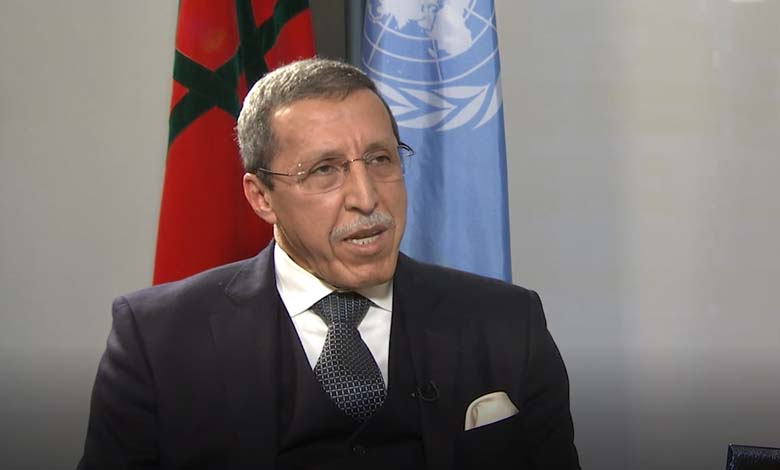Morocco: The Most Qualified to Represent Africa at the Security Council

Morocco’s Permanent Representative to the United Nations affirms that the Kingdom has all the qualifications to legitimately secure a permanent seat on the Security Council.
Omar Hilale, Morocco’s Permanent Representative to the United Nations, stated that his country is capable of representing the African continent as a permanent member of the Security Council. He emphasized that Rabat has demonstrated its commitment to defending the region’s interests while fostering close ties with African nations and prioritizing the well-being of their populations by strengthening cooperation across various sectors. These efforts are a legitimate testament to Morocco’s eligibility for this position.
-
Morocco and Mauritania Explore New Avenues for Military Cooperation
-
Extension of MINURSO Mission: Diplomatic Victory for Morocco and Setback for Algeria
During the 13th session of the annual Atlantic Dialogues conference, organized by the Policy Center for the New South, Hilale asserted that “Morocco, under the leadership of King Mohammed VI, has proven its ability to represent the continent and defend Africa’s causes and interests,” according to the Moroccan Press Agency (MAP).
This status did not arise by chance but is the result of Morocco’s deep engagement with Africa, building bridges of communication, and forging partnerships based on mutual economic benefits. Additionally, Rabat has played a central role in promoting spiritual security in the region by training imams in Morocco and constructing mosques in several African countries, which have become beacons for spreading the values of tolerant Islam.
-
Convergence of Views Strengthens Relations Between Morocco and the UAE
-
Morocco urges for a solution to the Libyan crisis under the UN umbrella
Hilale added, “The Kingdom is qualified to become a member of the Security Council because, quite simply, the primary criterion for membership is contributing to global peace and security, particularly through participation in peacekeeping missions.”
The ambassador highlighted Morocco’s efforts since the 1960s to bolster security in the region, noting that “Morocco is among the most active countries in deploying its soldiers for UN peacekeeping missions worldwide.”
-
Morocco Urges Algeria to Engage in Peace Rather than Chasing Illusions
-
Switzerland Supports a Realistic and Acceptable Political Solution to the Moroccan Sahara Issue
Morocco has accumulated significant expertise in addressing security and developmental challenges, proving its ability to offer innovative solutions for Africa. The Atlantic Initiative launched by Rabat, aimed at enhancing access for Sahel countries to vital maritime corridors, demonstrates that the Kingdom focuses on addressing the developmental needs of the region through unprecedented initiatives, drawing on its deep understanding of African realities.
Hilale also pointed out, “The Royal Armed Forces have played a crucial role, particularly in Africa, thanks to their knowledge of African cultures, language, and social work provided to populations, as well as fostering dialogue between communities, in line with royal directives.”
-
The Sahara, a pivotal file for determining the trajectory of relations between Paris and Rabat
-
Morocco Responds Legally to Algerian Allegations Regarding Confiscation of Real Estate for Public Benefit
Regarding the second criterion of democracy, Hilale affirmed, “The Kingdom is a state of law, firmly committed to universal values and respect for the Charter and principles of the United Nations.”
He continued, “Morocco is deeply involved in bilateral and trilateral cooperation, in addition to its efforts and initiatives in mediation,” while highlighting the UN’s recognition of the Kingdom’s role in cooperation and humanitarian aid.
Hilale concluded, “For these reasons, Morocco has the legitimate qualifications to secure, at the right time, a permanent seat on the Security Council.”
-
Terrorist Groups Exploit Concepts and Terminologies to Persuade Youth to Join Them… Learn About the Most Important Ones
-
Morocco begins Atlantic Initiative by reducing buffer zone with Mauritania
Many countries have long called for a reform of the Security Council’s structure, given the failure of its current mechanism to address numerous crises threatening international peace and security.
On September 12, the United States announced its support for a proposal by President Joe Biden, made two years ago, to grant two permanent seats on the Council to African nations.
The Security Council currently comprises 15 members: 10 countries elected periodically and 5 permanent members with veto power (the United States, the United Kingdom, France, China, and Russia). It is the only institution authorized to adopt binding resolutions for UN General Assembly member states (193 countries) under Article 23 of the UN Charter.
-
Summit Meeting between the Moroccan Monarch and the Spanish Prime Minister
-
The broader opening towards Morocco brings Niger closer to an official recognition of the Moroccan Sahara
Over the past years, Morocco has strengthened its partnerships with African countries, demonstrating its commitment to driving the developmental process in the region. It has also been at the forefront of extending support to nations facing economic and social crises, either through bilateral cooperation programs or financial aid.
Currently, Morocco chairs the African Union’s Peace and Security Council, a recognition of its international efforts to secure the continent and resolve numerous crises. It also plays a pivotal role in reducing tensions through effective diplomacy that prioritizes dialogue, free from political overreach or interference in domestic affairs.
-
France expresses a strong desire to end tensions with Morocco
-
Algeria pursues ineffectively Morocco’s expansion into distant geographical spaces
-
Morocco confronts Algeria’s claims regarding the Sahara at the United Nations












